Classic Lasagna
This post may contain affiliate links. Read my full disclosure policy.
Comforting, familiar flavors but refined—my all-time favorite lasagna layers oven-ready noodles, a rich meat sauce, veggies, and plenty of cheese.
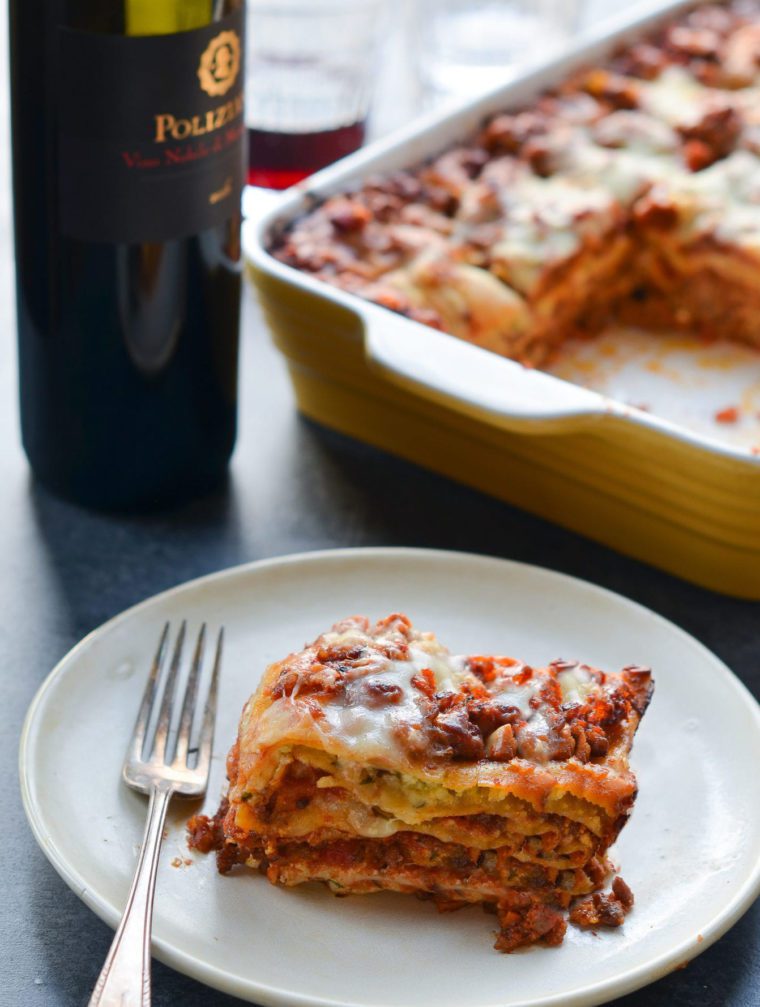
I love this lasagna recipe because it beautifully combines the familiar flavors of the lasagna I grew up on with the refined taste of a restaurant-style dish. It’s also relatively easy to make, thanks to the use of oven-ready or no-boil lasagna noodles, which save time and effort while delivering a taste remarkably similar to fresh homemade pasta—a definite win! The noodles are layered with a flavorful meat sauce made with Italian sausage, vegetables, crushed tomatoes, and cream, as well as creamy ricotta, gooey mozzarella, and Parmesan cheese. Baked until bubbly and golden, it’s the perfect cozy dish for a crowd, and it reheats and freezes well, too. This is definitely my go-to lasagna recipe!
Table of Contents
“Best Lasagna recipe – ever! And that includes those prepared in notable Italian restaurants…Conversation at the dinner table was reduced to sighs of delight and the utterance of an occasional OMG or YUM.”
What You’ll Need To Make Lasagna
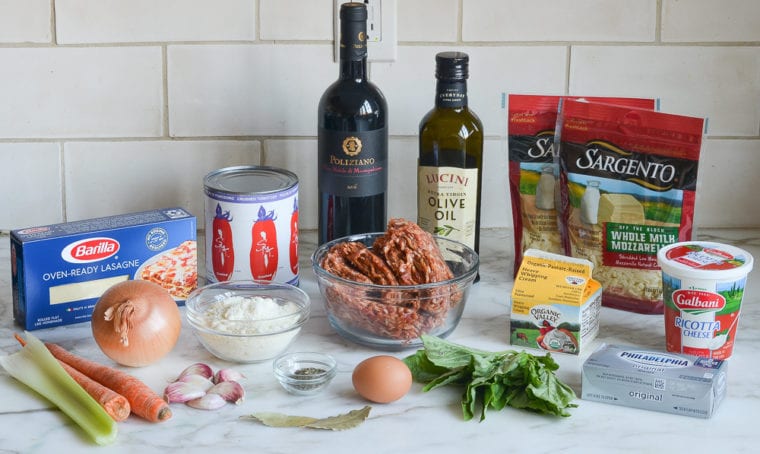
- Onion, Garlic, Carrots, and Celery: These vegetables are the base of the sauce, contributing to the depth of flavor.
- Italian Sausage: The key flavor component of the sauce, it adds richness and depth of flavor with its spices and fat content.
- Red Wine: Ådds acidity and complexity to the sauce.
- Canned Crushed Tomatoes: Provides body, acidity, and tomato flavor to the sauce.
- Heavy Cream: Added to the tomato sauce to balance the acidity of the tomatoes and wine.
- Thyme and Bay Leaves: These herbs contribute aromatic flavors to the sauce.
- Ricotta Cheese: Mixed with egg, cream cheese, and Parmigiano-Reggiano, used as a creamy layer in the lasagna, adding moisture and richness.
- Cream Cheese: Adds extra creaminess and tang to the ricotta mixture, and prevents the ricotta from becoming grainy when baked.
- Egg: Acts as a binder in the ricotta mixture, helping it to set and maintain structure when the lasagna is baked.
- Parmigiano-Reggiano: A hard, aged cheese that’s rich in flavor, added to the ricotta mixture and also sprinkled on top of the lasagna.
- Oven-Ready (No Boil) Lasagna Noodles: These noodles do not require pre-boiling, which means you don’t have to worry about them slopping around and sticking together, which is always an issue when using regular lasagna noodles to prepare lasagna. They absorb moisture from the sauce and cheese during baking, cooking to perfect tenderness. I like the Barilla brand.
- Mozzarella Cheese: Adds stretchy, melty texture to the layers of the lasagna.
- Jump to the printable recipe for precise measurements
Step-By-Step Instructions
1. Make the Sauce
Begin by placing the onions, garlic, carrots, and celery in a food processor. You need to give them a rough chop first, otherwise, they won’t chop evenly.
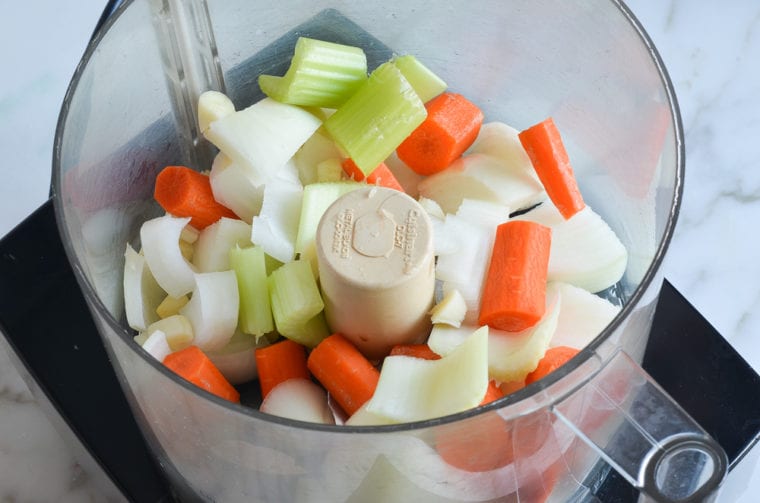
Pulse until minced but not puréed, so that they melt into the sauce.
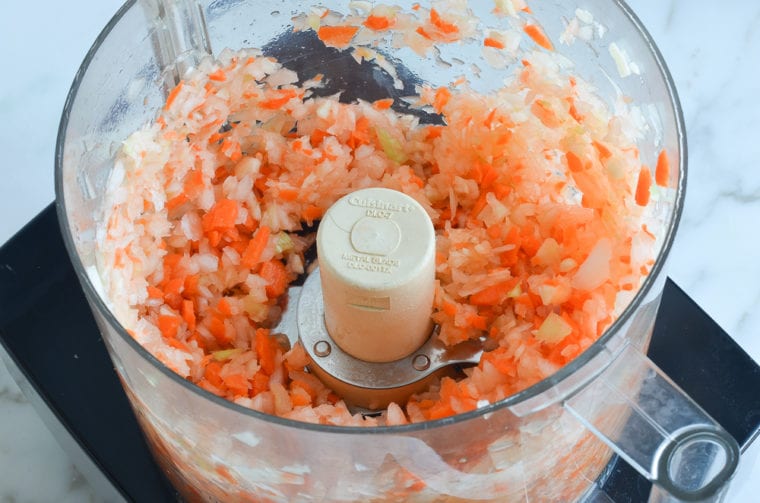
Heat 2 tablespoons of the olive oil in a large pot over medium-high heat, and add the sausage.
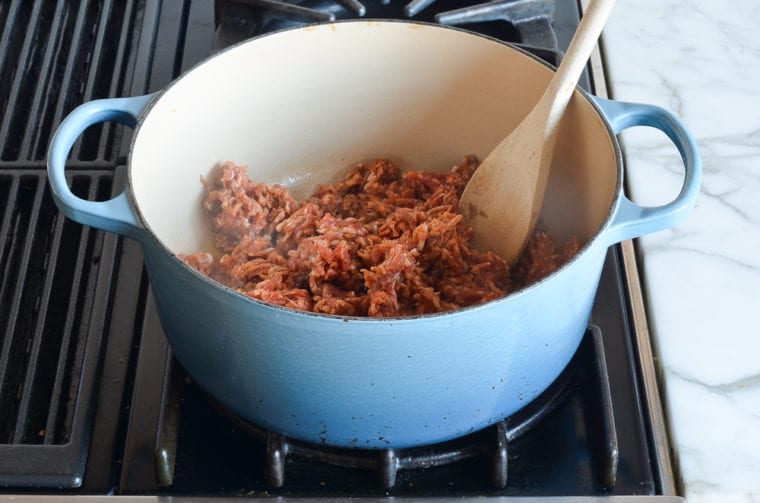
Cook, stirring occasionally and breaking the sausage into small pieces, until slightly browned but not cooked all the way through, about 5 minutes. Using a slotted spoon, transfer the partially cooked sausage to a plate. Set aside.
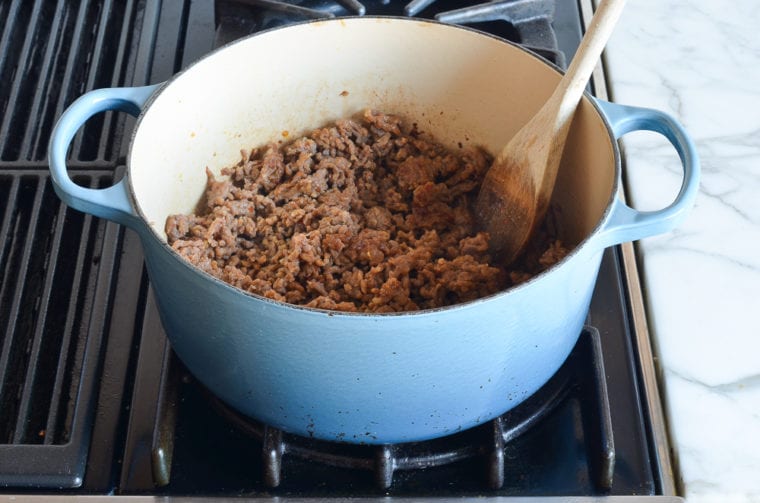
Add the remaining tablespoon of olive oil to the pan, reduce the heat to medium, and add the minced vegetables.
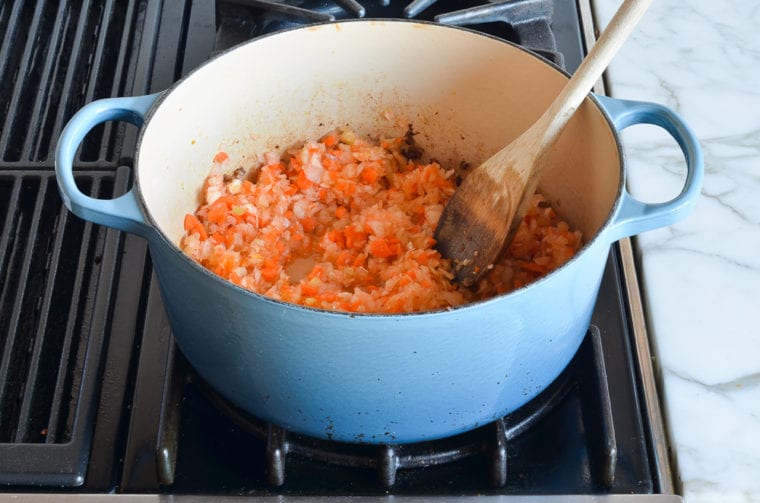
Cook, stirring frequently, until the vegetables are very soft, 6 to 8 minutes. Do not brown; reduce the heat if necessary.
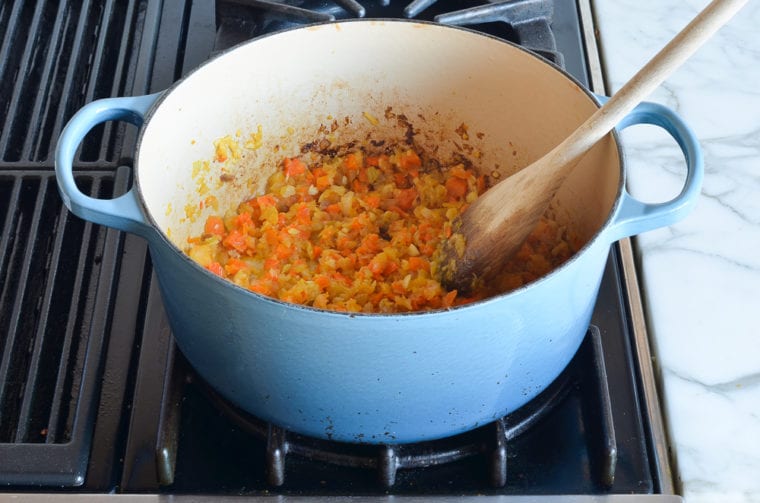
Add the wine and continue cooking, stirring to scrape any brown bits from the bottom of the pan, until the wine is mostly absorbed by the vegetables, a few minutes.
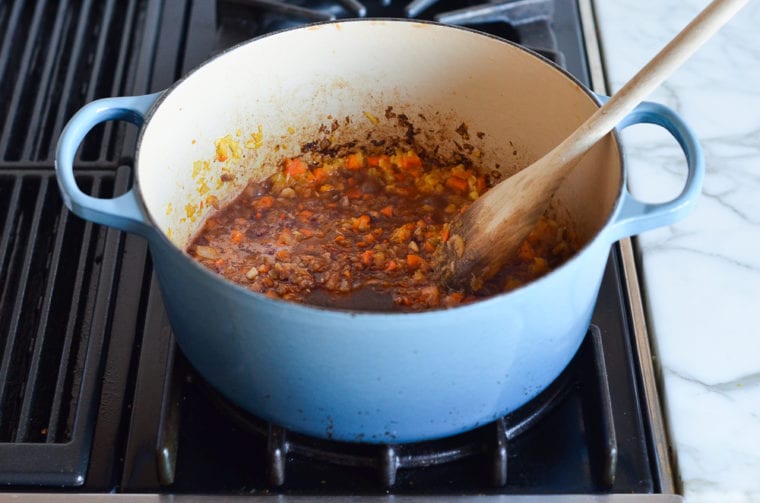
Add the tomatoes, cream, salt, pepper, sugar, thyme and bay leaves.
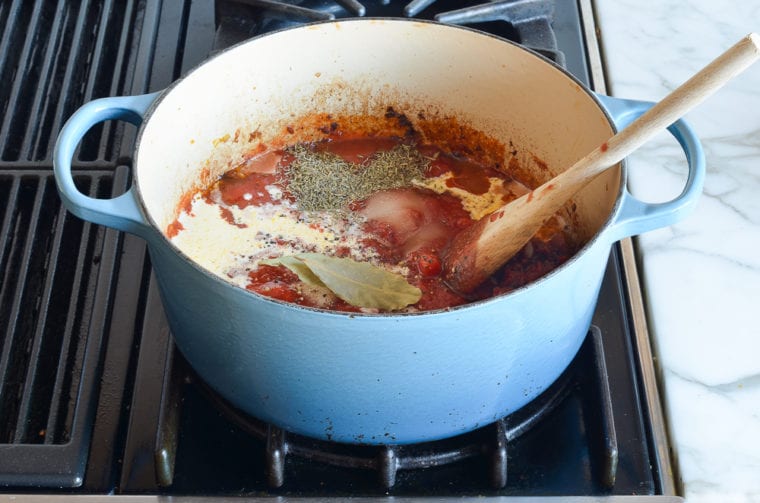
Stir and bring to a boil.
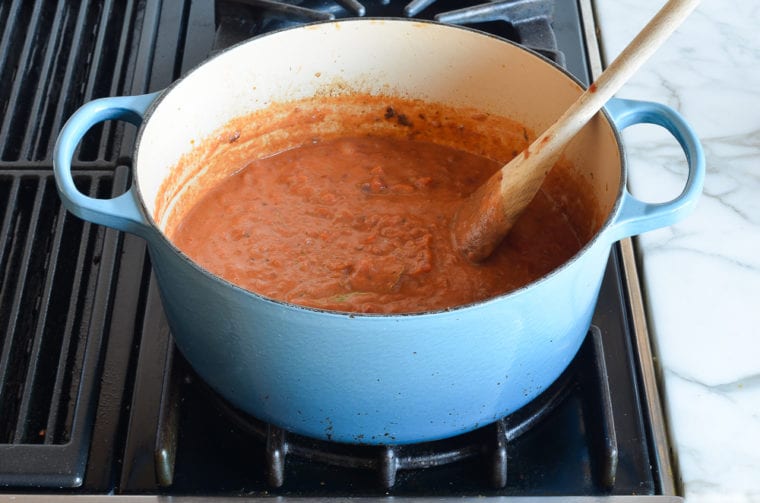
Reduce the heat and simmer until the sauce is thickened, about 20 minutes.
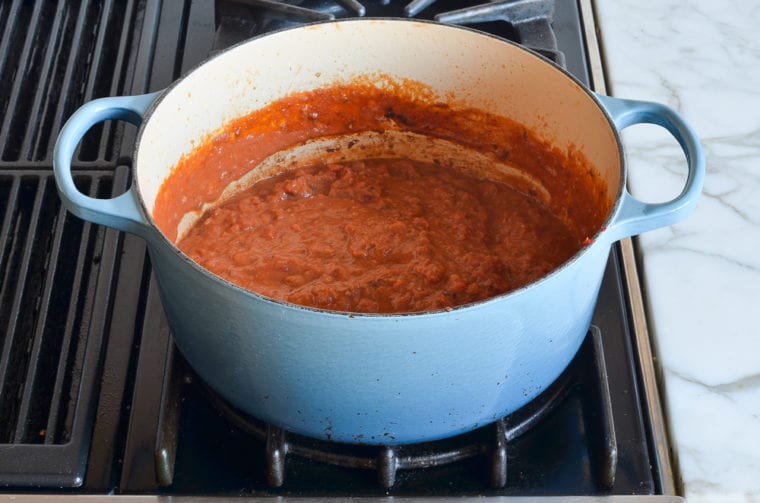
Add the sausage back to the pot.
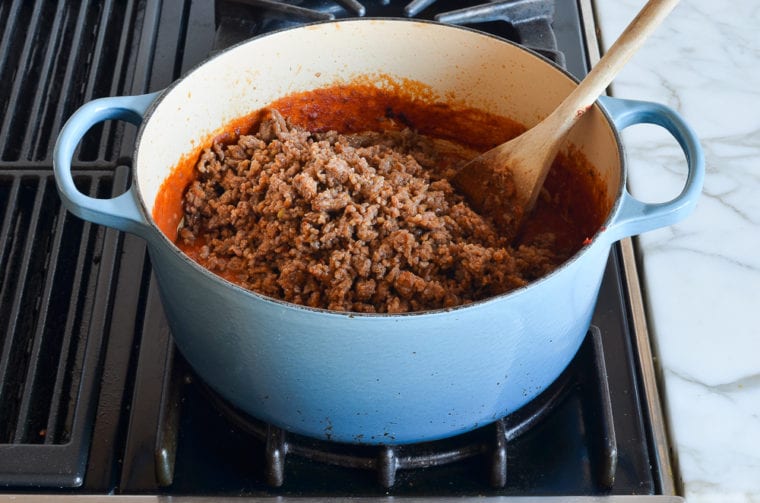
Continue simmering until the sausage is fully cooked and the flavors all meld together, about 10 minutes. Taste and adjust seasoning if necessary. Fish out the bay leaves and discard.
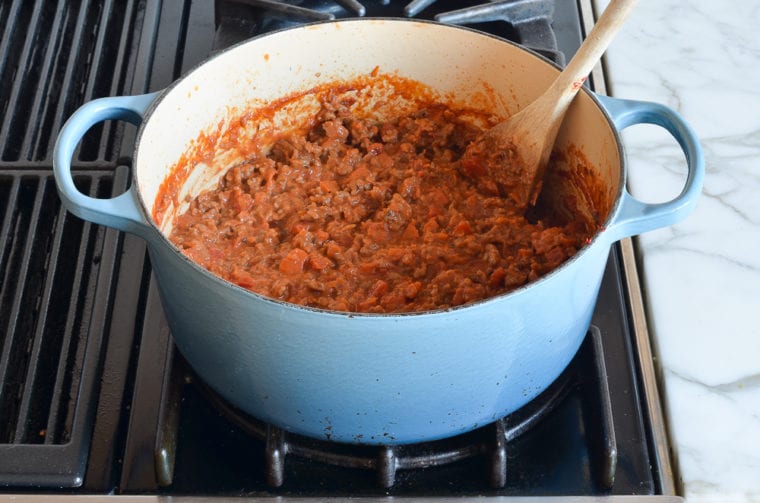
2. Make the Ricotta Filling
Combine the ricotta, cream cheese, egg, garlic, Parmigiano-Reggiano, salt and pepper in the bowl of a food processor fitted with a metal blade.
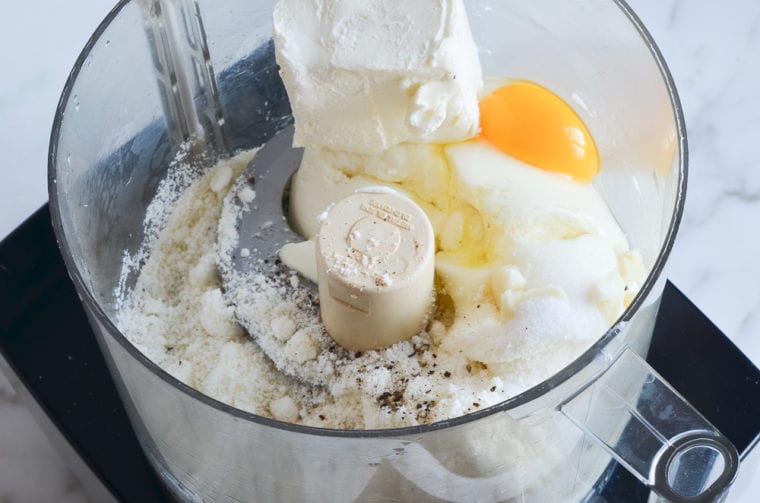
Process until evenly combined, then add the basil.
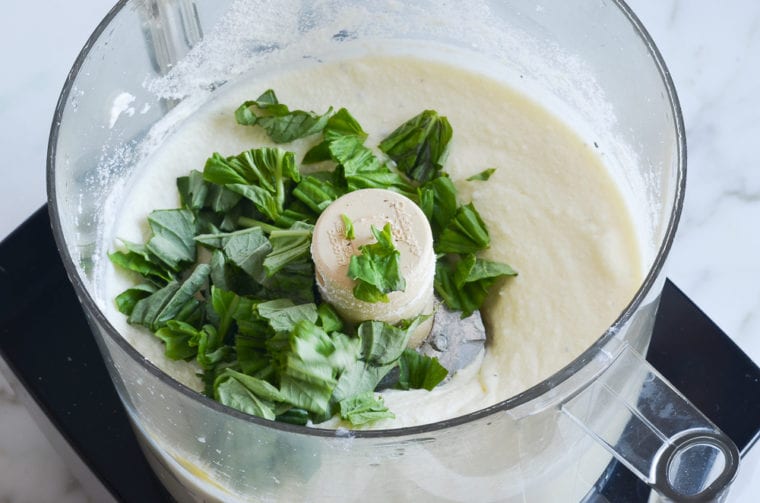
Pulse until the basil is finely chopped.
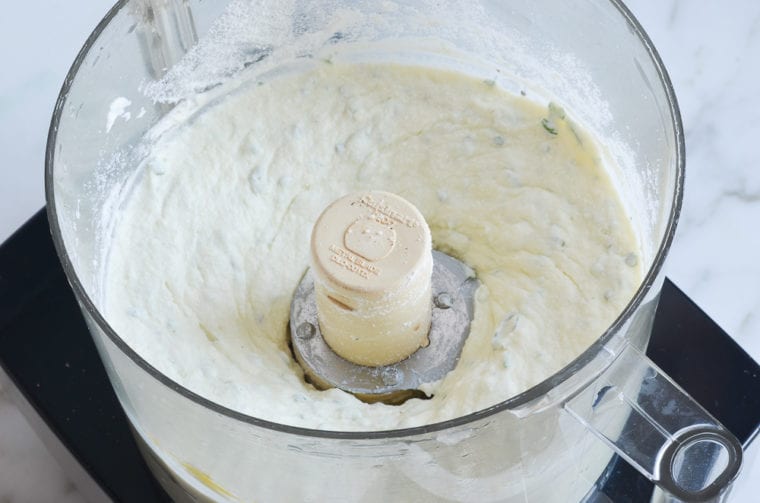
3. Assemble the Lasagna
Spread about 1-1/2 cups of sauce in the bottom of the baking dish.
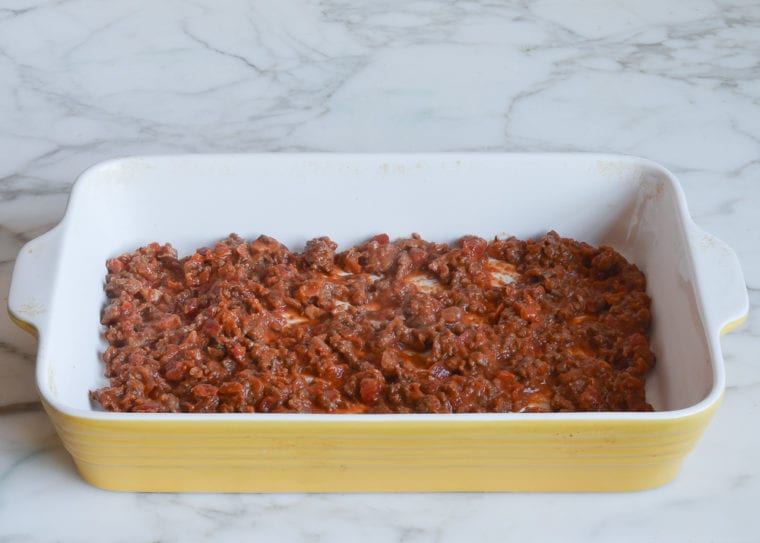
Arrange 3 noodles over the sauce, and dollop a third of the ricotta filling over the noodles.
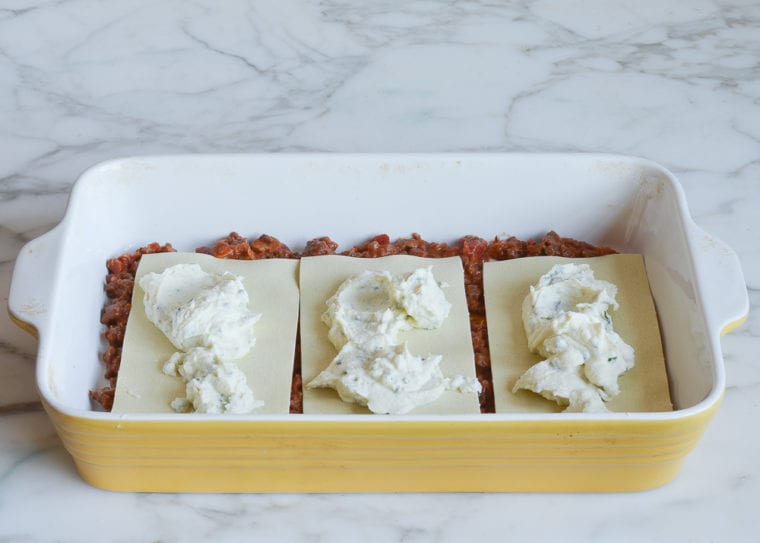
Spread the ricotta mixture evenly over the noodles.
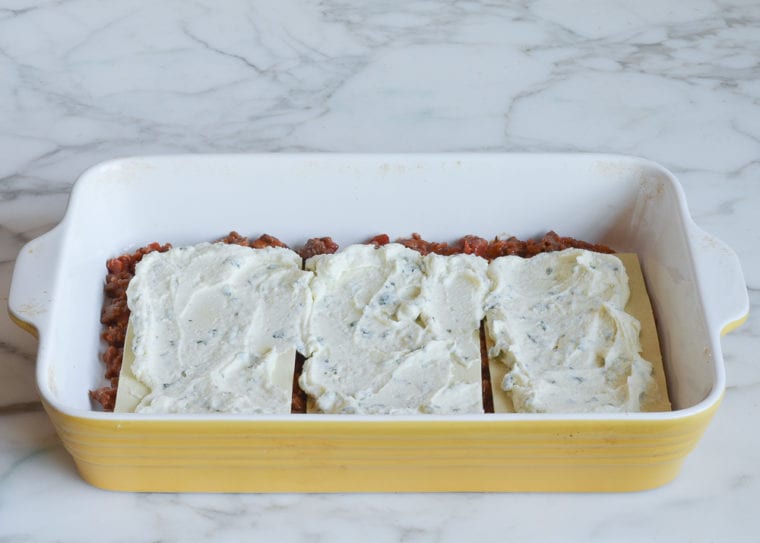
Sprinkle with 3/4 cup mozzarella cheese.
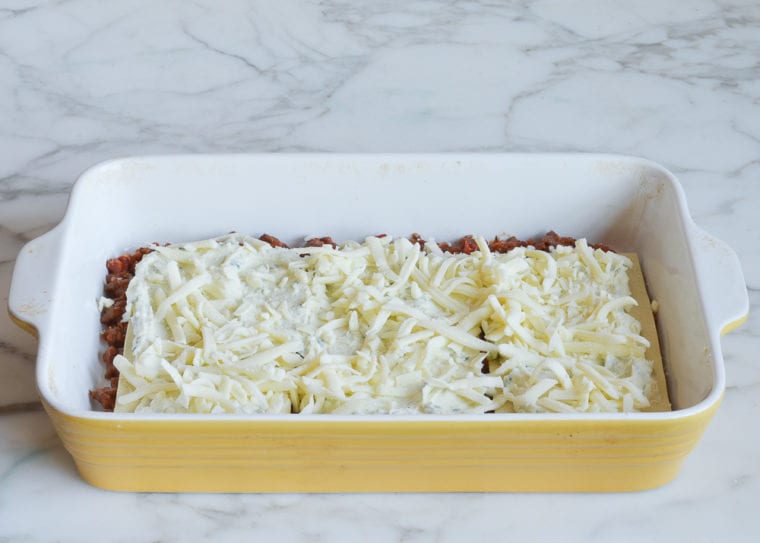
Repeat layering of sauce, noodles, ricotta filling and mozzarella 2 more times. Top with the remaining 3 noodles. Spoon the remaining sauce over the noodles, then sprinkle with the remaining mozzarella and 1/4 cup Parmigiano-Reggiano.
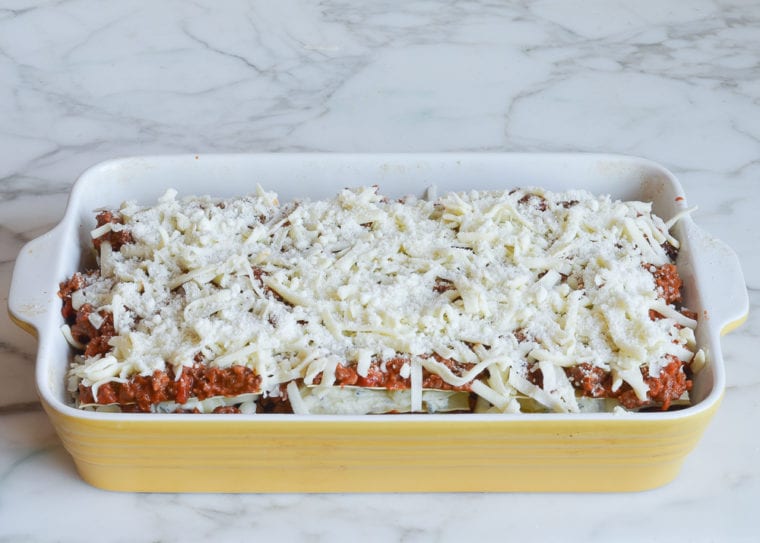
Spray a large piece of foil with nonstick cooking spray. Cover the lasagna tightly with the foil, sprayed side down. Bake for 40 minutes in a 375°F oven. Carefully uncover and increase the oven temperature to 400°F. Bake, uncovered, until the noodles are tender, the sauce is bubbling, and the edges are golden and puffed, about 20 minutes.
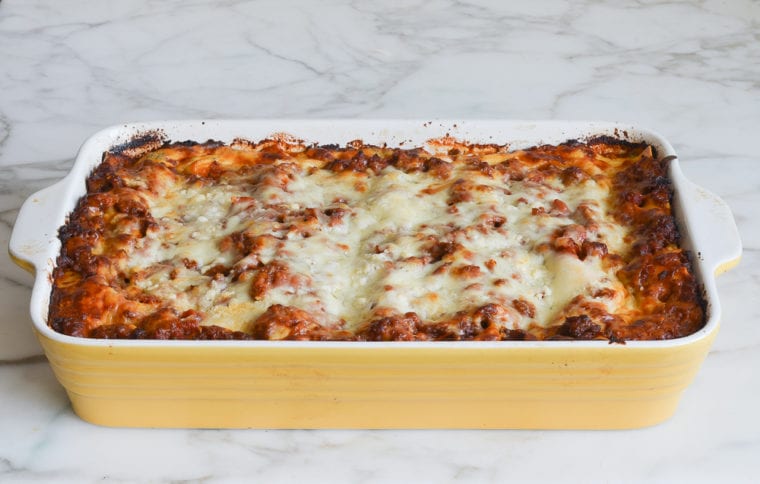
Remove from the oven and let stand for 15 to 20 minutes before serving.
Frequently Asked Questions
Absolutely! The lasagna can be assembled and refrigerated up to 1 day ahead of time before baking. Allow a few extra minutes in the oven if baking from cold.
Yes, lasagna can be frozen for up to 3 months. If you choose to freeze it before baking, ensure it is thoroughly defrosted in the refrigerator for 24 hours before you follow the recipe’s baking instructions. For already baked lasagna, place any leftovers in a freezer-safe container, or cut it into individual servings. Each serving should be tightly wrapped first in plastic wrap and then in foil. To reheat, cover the lasagna with foil and warm it in an oven preheated to 325°F (165°C) until it is heated through.
Italian sausage is the best choice for this recipe because it is loaded with spices and herbs, such as salt, oregano, basil, fennel, garlic, and red pepper flakes. In contrast, ground beef is completely unseasoned, which means it lacks these built-in flavors. If you decide to use ground beef, I recommend amping up the seasoning by adding a mix of herbs and spices mentioned above.

Video Tutorial
You May Also Like
Classic Lasagna
Comforting, familiar flavors but refined—my all-time favorite lasagna layers oven-ready noodles, a rich meat sauce, veggies, and plenty of cheese.
Ingredients
For the Sauce
- 1 medium yellow onion, roughly chopped
- 5 garlic cloves, roughly chopped
- 2 medium carrots, roughly chopped
- 1 stalk celery, roughly chopped
- 3 tablespoons olive oil, divided
- 1½ pounds Italian sausage (bulk or removed from casing)
- ¾ cup dry red wine
- 1 (28 oz.) can crushed tomatoes
- ½ cup heavy cream
- ¾ teaspoon salt
- ¼ teaspoon freshly ground black pepper
- 2 teaspoons sugar
- 1½ teaspoons dried thyme
- 2 bay leaves
For the Ricotta Mixture
- 1 (15 oz.) container whole milk ricotta (about 1¾ cups)
- 3 oz. cream cheese
- 1 large egg
- 1 garlic clove, roughly chopped
- ¾ cup grated Parmigiano-Reggiano
- ¾ teaspoon salt
- ¼ teaspoon freshly ground black pepper
- ½ cup roughly chopped fresh basil
For Assembling
- 12 oven ready (no boil) lasagna noodles (such as Barilla)
- 16 ounces shredded whole milk mozzarella cheese
- ¼ cup grated Parmigiano-Reggiano
Instructions
For the Sauce
- Place the onions, garlic, carrot and celery in the bowl of a food processor fitted with the metal blade; pulse until finely minced but not puréed.
- Heat 2 tablespoons of the olive oil in a large pot over medium-high heat. Add the sausage into the pan and cook, stirring occasionally and breaking the sausage into small pieces, until slightly browned but not cooked all the way through, about 5 minutes. Using a slotted spoon, transfer the partially cooked sausage to a plate. Set aside.
- Add the remaining tablespoon olive oil to the pan, reduce the heat to medium, and add the minced vegetables. Cook, stirring frequently, until the vegetables are very soft, 6 to 8 minutes. Do not brown; reduce the heat if necessary.
- Add the wine; continue cooking, stirring to scrape any brown bits from the bottom of the pan, until the wine is mostly absorbed by the vegetables, a few minutes.
- Add the tomatoes, cream, salt, pepper, sugar, thyme and bay leaves and bring to a boil. Reduce the heat and simmer, covered, until the sauce is thickened, about 20 minutes.
- Meanwhile, transfer the sausage to a cutting board and chop into smaller pieces (big chunks don't work well in lasagna).
- Add the sausage back to the pan and continue simmering, covered, until the sausage is fully cooked and the flavors meld together, about 10 minutes. Taste and adjust seasoning if necessary. Fish out the bay leaves and discard.
For the Ricotta Mixture
- Combine the ricotta, cream cheese, egg, garlic, Parmigiano-Reggiano, salt and pepper in the bowl of a food processor fitted with a metal blade. Process until evenly combined. Add the basil and pulse until finely chopped.
For Assembly
- Preheat the oven to 375°F.
- Spread about 1½ cups of sauce in the bottom of a 13x9x2-inch baking dish. Arrange 3 noodles over the sauce (there will be a bit of space between the noodles; they expand as they cook). Dollop a third of the ricotta filling over the noodles, then spread evenly to cover. Sprinkle with ¾ cup of the mozzarella cheese. Repeat the layering of sauce, noodles, ricotta filling and mozzarella 2 more times. Top with the remaining 3 noodles. Spoon the remaining sauce over the noodles, then sprinkle with the remaining mozzarella and ¼ cup Parmigiano-Reggiano.
- Spray a large piece of foil with nonstick cooking spray. Cover the lasagna tightly with the foil, sprayed side down. Bake for 40 minutes. Carefully uncover and increase the oven temperature to 400°F. Bake, uncovered, until the noodles are tender, the sauce is bubbling, and the edges are golden and puffed, about 20 minutes. Remove from the oven and let stand for about 15 minutes before serving.
- Make-Ahead Instructions: The lasagna can be assembled and refrigerated up to 1 day ahead of time before baking. Allow a few extra minutes in the oven if baking from cold.
- Freezer-Friendly Instructions: The lasagna can be frozen for up to 3 months. If you choose to freeze it before baking, ensure it is thoroughly defrosted in the refrigerator for 24 hours before you follow the recipe's baking instructions. For already baked lasagna, place any leftovers in a freezer-safe container, or cut it into individual servings. Each serving should be tightly wrapped first in plastic wrap and then in foil. To reheat, cover the lasagna with foil and warm it in an oven preheated to 325°F until it is heated
Pair with
Nutrition Information
Powered by ![]()
- Per serving (8 servings)
- Serving size: 1 slice
- Calories: 776
- Fat: 45g
- Saturated fat: 23g
- Carbohydrates: 47g
- Sugar: 9g
- Fiber: 4g
- Protein: 46g
- Sodium: 1812mg
- Cholesterol: 158mg
This website is written and produced for informational purposes only. I am not a certified nutritionist and the nutritional data on this site has not been evaluated or approved by a nutritionist or the Food and Drug Administration. Nutritional information is offered as a courtesy and should not be construed as a guarantee. The data is calculated through an online nutritional calculator, Edamam.com. Although I do my best to provide accurate nutritional information, these figures should be considered estimates only. Varying factors such as product types or brands purchased, natural fluctuations in fresh produce, and the way ingredients are processed change the effective nutritional information in any given recipe. Furthermore, different online calculators provide different results depending on their own nutrition fact sources and algorithms. To obtain the most accurate nutritional information in a given recipe, you should calculate the nutritional information with the actual ingredients used in your recipe, using your preferred nutrition calculator.

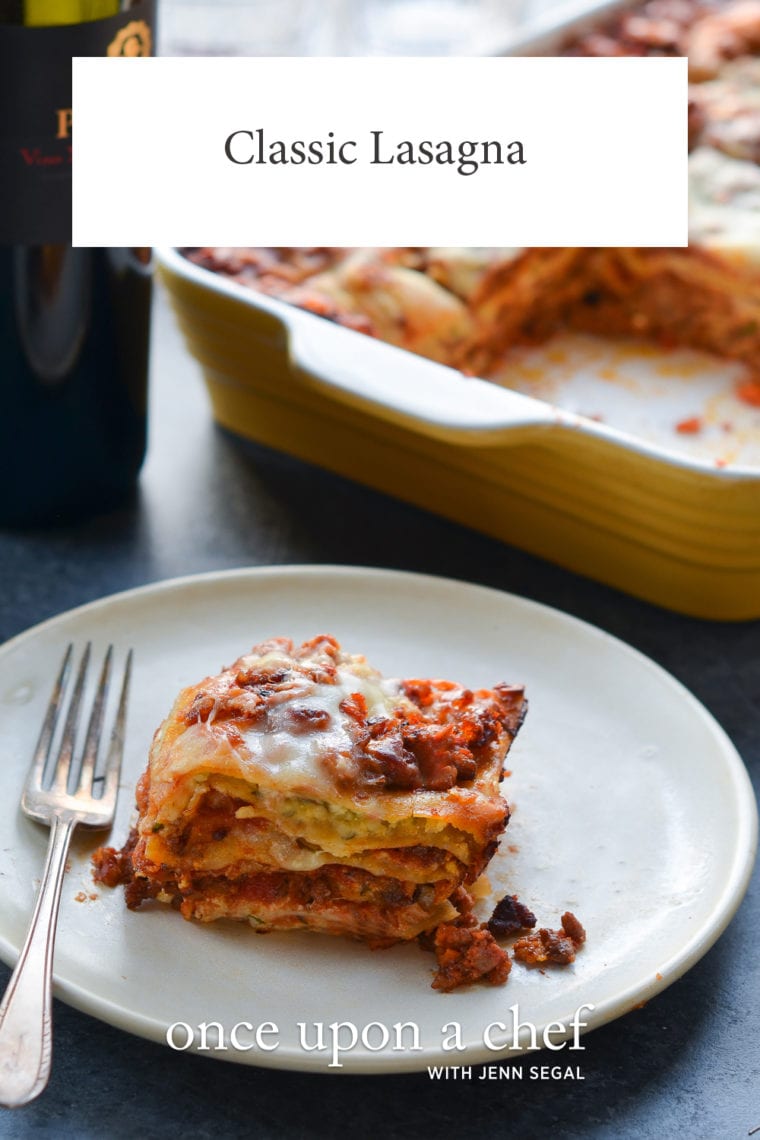
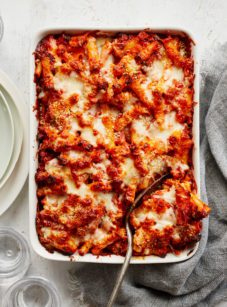
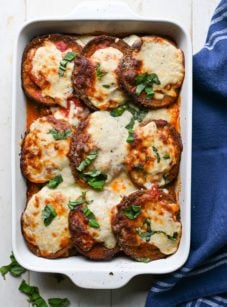
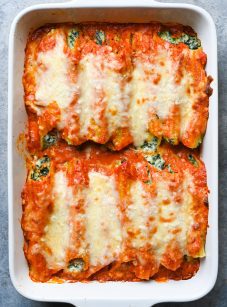
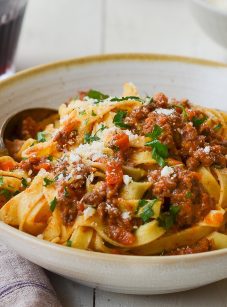
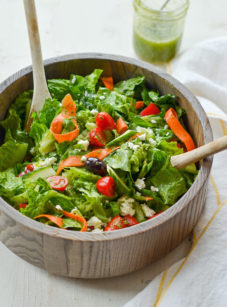
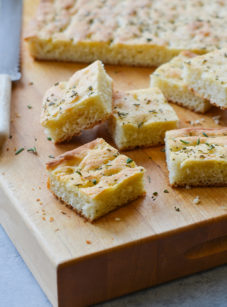
Is there a vegetarian version of this recipe ?
Hi Sophia, Sorry, I don’t have a vegetarian version, but I will work on it. Stay tuned 🙂
Hello! This recipe looks absolutely delightful, but I have a problem. I am underage, so I can’t purchase alcohol, and my parents do not care much for alcoholic beverages like red wine so I do not have any bottles lying around. The alcohol wilI probably evaporate during cooking, but my parents are still worried. Is there any substitute?
Sam, No worries, it’s fine to just leave it out — it will still be delicious. 🙂
This looks devine. Do you think beef mince would work in place of the italian sausage?
Hi Mim, I’d honestly stick with sausage — it adds a ton of flavor to the sauce.
Hi, have tried many lasagna’s over the years
and always disappointed.
This one sounds good, one question…
can this be prepared early in the day and baked for supper? Also what is the best way to reheat it?
My previous issues are too much water/liquid on the plate when I serve it.
Will this do the same?
Thanks!
Hi Deborah, You can definitely prepare this lasagna in the morning, or even a day ahead, and bake it for supper. Leftovers can be reheated in the microwave (in individual portions) or covered with foil in a 325°F oven until hot. And you should not have the issue of water/liquid on the plate with this recipe. Hope you enjoy it, and please let me know how it turns out!
After 42 years of marriage and lots and lots of multiple overnight houseguests, I usually make lasagna ahead and freeze. I then thaw for 24 hours in the refrigerator and bake. Will this recipe freeze well?
Yes, Jean — lasagna freezes well. Ideally, you want to assemble it in a freezer/oven-safe container and freeze it unbaked. When you’re ready to cook the lasagne, defrost in the refrigerator for 24 hours, then proceed with the baking instructions in the recipe.
This sounds great, and I love the no-boil noodles! Do you think marscapone would work as a sub for the cream cheese if I wanted to keep it all Italian?
Yes, Erin — I think mascarpone would work well. Enjoy, and please let me know how it turns out!
This was delicious!! I made it tonight swapping marscapone for the cream cheese and it worked perfectly! I also made one other change to accomodate my little one which was to reduce the Italian sausage (sigh… five year olds and their palates!!). I used one pound of 85/15 ground beef with three mild Italian sausage links. I then added all the meat back to the sauce immediately to simmer for the full 30 minutes to get as much of a flavor bump as possible. It was delicious and very impressive for only 30 minutes! I usually simmer my family’s bolognese recipe for at least a couple hours. I am definitely going to steal some of the method from this recipe to improve upon that beloved recipe even more. I also successfully split the recipe into two 8x8s – I had to be very judicious with my sauce near the end, but I made it! I gave half to my parents and they loved it too. What a great recipe! Thanks!!
I love all of your dishes that I have made so far, great recipes! The sausage lasagna do you boil the noodle?
Hi Tamara, Thanks! I use no-boil lasagna noodles (made by Barilla), which you should be able to find in the pasta section of your supermarket. They make lasagna much easier!
This will be delicious as every recipe of yours I’ve tried. Thank you Jenn!
I’m always at a loss as to what to take for a homemade dinner for someone when ill, just moved, etc. I assume this would freeze well perhaps and could bake in aluminum disposable pans ? What suggestions would you make for freezing and if could put it into a couple of smaller sizes to pull out say for just 2 people?
I’m making a grocery list to prepare this for my church Singles group this weekend! I trust your recipes much, it’s comforting to know I can prepare one for a group without a test run!
Hi Debra, Ideally, you should freeze lasagna unbaked — simply assemble the lasagne in a freezer-safe/oven-safe container, cover tightly, and freeze. When you’re ready to cook the lasagne, defrost in the refrigerator for 24 hours, then proceed with the baking instructions in the recipe. That’s a great idea to freeze it in smaller portions — just assemble it in smaller pans and keep an eye on it in the oven as you may need to reduce the cooking time just a bit.
Hi Jennifer….
This recipe sounds great, and am looking forward to trying it. I find the addition of cream cheese an interesting ingredient to Lasagna, as I have never used it in Lasagna before. As I love cream cheese, I am just wondering if it wouldn’t make the lasagna too rich(?)
or..maybe on the other hand that wouldn’t be such a bad thing! 🙂
Hi Ann, I promise it doesn’t make it too rich. It really just adds a very slight (and pleasant) tang, and ensures that the ricotta bakes up creamy instead of grainy.
Hi Jennifer,
made this on the weekend. Delicious! Cream cheese and all! Great Lasagna recipe. Will stick with this one. Thanks again!
So glad, Ann! Thx for letting me know. 🙂
This is really good my whole family loves it!!! Since it is time consuming can I make it the day before (not bake) and leave it in the fridge. Then next day I just throw it in the oven?
Sure, Diane, that would be fine. You can also bake it ahead of time, refrigerate it, and reheat it the next day prior to serving. Hope that helps!
I’m not a big fan of ricotta cheese. Could I use fresh mozzarella instead?
Hi Brian, You could but that would be a lot of mozzarella in one lasagna. You might try it with the ricotta/cream cheese blend suggested; it sort of melts into the mozzarella and doesn’t have a strong flavor. Plus the texture of the ricotta is much improved by adding cream cheese.
Wouldn’t béchamel work in place of the ricotta? And, the cream cheese would make it even richer.
Hi Beverly, You could definitely use a béchamel in place of the ricotta, but in that case I would probably omit the ricotta/cream cheese mixture and mozzarella and just make a straight Lasagna Bolognese. This is more a typical American-Italian lasagna.